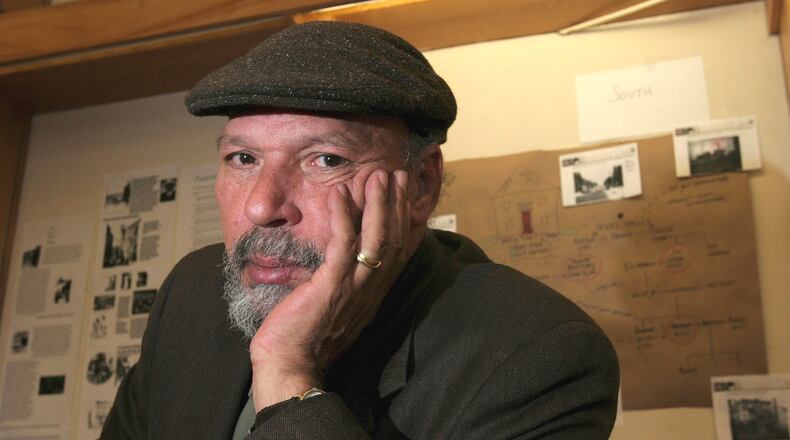Set in Pittsburgh’s Hill District circa 1997, the action centers on the privileged, Ivy League-educated Harmond Wilks, whose integrity is challenged while running to become the first Black mayor of Pittsburgh. The play also involves real estate developers who look to tear down the home of recurring Wilson character Aunt Esther. History and legacy collide as themes of personal aspirations, progress, gentrification, marriage and community swell.
Credit: RICK FLYNN PHOTOGRAPHY
Credit: RICK FLYNN PHOTOGRAPHY
Wilson won the Tony Award for “Fences” and the Pulitzer Prize for “Fences” and “The Piano Lesson.“ However Guild organizers say the decision to choose the lesser-known, rarely produced “Radio Golf” presented more exciting challenges. In addition to having an inherent desire to sidestep the norm, they realized the play would provide an overdue opportunity for diverse casting.
“We will always go for (scripts) that are less seen,” said Guild President Carol Finley. “And I’m excited for us to have new faces and returning faces. We don’t have enough multiracial casting here on a general basis and we’re trying to change that. It’s the right time, the right script and the right season.”
The cast consists of Franklin Johnson as Elder Joseph “Old Joe” Barlow, S. Francis Livisay as Harmond, Jena Perry as Mame Wilks, Lessley Scott as Roosevelt Hicks, and Andre Tomlinson as Sterling Johnson.
The Black Shakespeare
Director Robert-Wayne Waldron, who portrayed Joe Louis in the Guild’s 2020 production of “Mr. Rickey Calls a Meeting,” appreciates Wilson’s mastery of language and conversation. As different generations of Black men interact in “Radio Golf,” he feels the script’s authenticity rises to Shakespearean proportions.
“I consider August Wilson like Shakespeare,” Waldron said. “He writes poetry, and his characters are so well-developed with great balance. In this play, Old Joe and Sterling are the poets. The things they talk about and how certain things are described take you to (Shakespeare). There is a scene in the play in which Old Joe talks about the American flag and being at war, and I dare anyone to hear that monologue without (having tears) in their eyes.”
Credit: RICK FLYNN PHOTOGRAPHY
Credit: RICK FLYNN PHOTOGRAPHY
Livisay, returning to the Guild following his portrayal of Reed in 2019′s “Icebergs,” finds the script richly layered and very purposeful.
“There is meaningful repetition in the script and it’s there for a particular reason,” Livisay said. “(The script) makes you stay in the moment, which is key for actors. It also grounds you and roots you. It’s a stressful blessing, but at the end of it all you can feel the pulse of what’s going on.”
The female perspective
Wilson’s 20th Century Cycle is male-dominated, but the roles he created for women sparkle with dynamic intent such as the devoted yet scorned Rose of “Fences,” the headstrong Berniece of “The Piano Lesson” and the sassy, larger-than-life Ma Rainey of “Ma Rainey’s Black Bottom.”
In “Radio Golf,” Harmond’s ambitious wife, Mame, fuels his quest to succeed as moral and ethical questions arise.
“Every character in an August Wilson play has a specific theme, represents a type of psyche of Black culture, and shows how we are able to process traumas and different experiences,” said Perry, a California native making her Guild debut. “Mame is a modern woman, flaws and all. She represents what it means to be a Black woman trying to define yourself in a world in which you not only have Black men telling you who you are and dismissing you, but you also have to enter the realm of white men dismissing and belittlingly you. There’s a lot of emotional labor juggling, but Wilson still allows Mame to be seen. There’s not a time I feel like she’s overshadowed or doesn’t have a voice. This role is very cathartic.”
Credit: RICK FLYNN PHOTOGRAPHY
Credit: RICK FLYNN PHOTOGRAPHY
An appealing universality
Wilson said of his legacy, “Before I am anything, a man or a playwright, I am an African American. The tributary streams of culture, history and experience have provided me with the materials out of which I make my art.”
Yet even as his identity defined his artistry, his plays weave a marvelously relatable tapestry of the human condition from families in crisis to communities coping with change. But in shaping his plays to address the Black experience, he also opened the door to relevant, thought-provoking discussions of race and society appealing to all audiences.
“His themes are universal and his characters are universal,” Finley said. “His use of language and the structures of his shows are incredible. And for ‘Radio Golf,’ the issue of what’s good for business vs. what might be right is an everyday issue that needs to be pointed out.”
The Guild also hopes this premiere will encourage other local troupes to produce more Black plays.
“We need more authentic productions of people we see in our town,” said stage manager Melissa Ertsgaard. “Dayton is a really close-knit, talented theater community and we need to find space for all of our voices.”
AUGUST WILSON’S 20TH CENTURY CYCLE
Gem of the Ocean
Decade: 1900s. Opened on Broadway: 2004
Aunt Esther takes Citizen Barlow on a spiritual journey to the City of Bones.
Joe Turner’s Come and Gone
Decade: 1910s. Opened on Broadway: 1988
Racism and discrimination fuel this tale of former slaves.
Ma Rainey’s Black Bottom
Decade: 1920s. Opened on Broadway: 1984
Racism and religion figure prominently in this tale of blues singer Ma Rainey attempting to record an album in Chicago with her band.
The Piano Lesson
Decade: 1930s. Opened on Broadway: 1990
Siblings feud over whether or not to sell a family heirloom that was exchanged for their great grandfather’s wife and son during slavery.
Seven Guitars
Decade: 1940s. Opened on Broadway: 1996
A talented blues singer faces obstacles in his pursuit of the American Dream.
Fences
Decade: 1950s. Opened on Broadway: 1987
Tensions mount between a bitter former Negro League baseball player-turned-garbageman and his son.
Two Trains Running
Decade: 1960s. Opened on Broadway: 1992
The Civil Rights movement is examined through the lives of customers at a diner in decline.
Jitney
Decade: 1970s. Opened on Broadway: 2017
This play examines the life experiences and relationships of different generations of cab drivers.
King Hedley II
Decade: 1980s. Opened on Broadway: 2001
An ex-convict attempts to start his life anew by selling stolen refrigerators with the hope of buying a video store.
Radio Golf
Decade: 1990s. Opened on Broadway: 2007
Harmond Wilks is running to be the first Black mayor of Pittsburgh. The arrival of an unexpected visitor challenges Harmond’s integrity.
HOW TO GO
What: “Radio Golf”
Where: Dayton Theatre Guild, 430 Wayne Ave., Dayton
When: Aug. 25-Sept. 10; Fridays at 8 p.m., Saturdays at 5 p.m. (with the exception of Aug. 26 at 8 p.m.) and Sundays at 3 p.m.
Cost: $14-$21
More info: www.daytontheatreguild.org
About the Author




